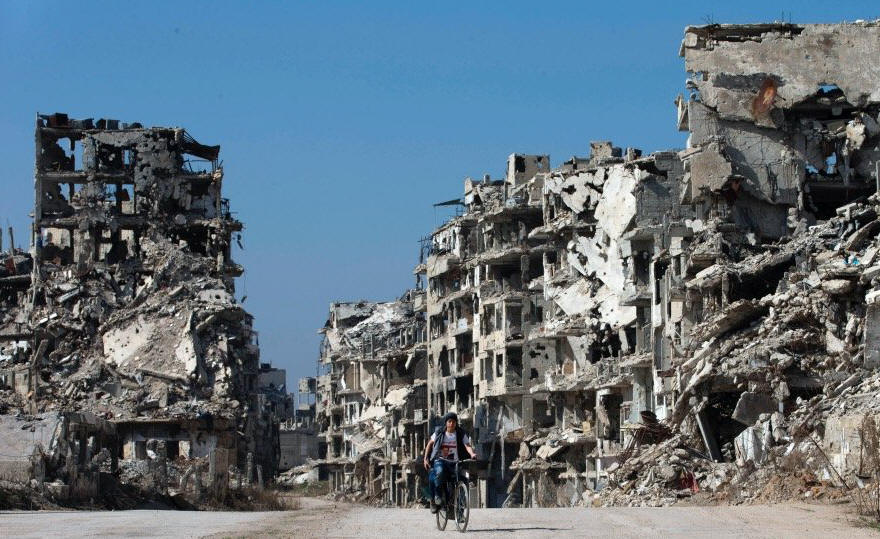U.N. OFFICIAL CONDEMNS U.S. SYRIA SANCTIONS
WARNS OF THEIR POTENTIAL TO KILL CIVILIANS

Alena Douhan was appointed as Special Rapporteur on the Negative Impact of the Unilateral Coercive Measures on the Enjoyment of Human Rights by the Human Rights Council in March 2020. This means that she is a key U.N. Official in terms of monitoring sanctions and the violation of human rights.
Douhan made the following statement on the sanctions against Syria, "The sanctions violate the human rights of the Syrian people, whose country has been destroyed by almost 10 years of ongoing conflict." (OHCHR)
She also added, "The conflict and violence have already had a dire impact on the ability of the Syrian people to realise their fundamental rights, having extensively damaged houses, medical units, schools, and other facilities."
The U.S. sanctions that went into effect in June 2020 could target any foreigner participating in the efforts to help reconstruct the devastated country, and even employees of foreign companies and humanitarian operators helping to rebuild Syria.
These sanctions are part of the Caesar Syria Civilian Protection Act, also known as the Caesar Act. They contain some of the most wide-ranging U.S. sanctions ever applied against Syria.
Since Syria’s economy is largely destroyed, it needs to be able to rely on foreign assistence in accessing vital humanitarian aid and rebuilding essential infrastructure.
On these sanctions, Douhan said, "I am concerned that sanctions imposed under the Caesar Act may exacerbate the already dire humanitarian situation in Syria, especially in the course of COVID-19 pandemic, and put the Syrian people at even greater risk of human rights violations."
"When it announced the first sanctions under the Caesar Act in June 2020, the United States said it did not intend for them to harm the Syrian population," Douhan said. "Yet enforcement of the Act may worsen the existing humanitarian crisis, depriving the Syrian people of the chance to rebuild their basic infrastructure."
The Caesar Act raises serious concerns under international law because of its unfettered emergency powers of the Executive and extraterritorial reach, she said. It also results in the high risk of over-compliance.
"What particularly alarms me is the way the Caesar Act runs roughshod over human rights, including the Syrian people's rights to housing, health, and an adequate standard of living and development. The U.S. government must not put obstacles in the way of rebuilding of hospitals because lack of medical care threatens the entire population's very right to life."
Another issue is that most of the people in Syria who require aid have no access to it.
NRC’s Middle East Regional Director, Carsten Hansen, said: “About two-thirds of the people in need of humanitarian assistance in Syria now reside in areas controlled by the government. In addition to the restrictions imposed by the government on humanitarians, several donor countries have been reluctant to scale up funding for programmes managed from Damascus. Our message to them is that people affected by war and displacement have the same right to assistance. It doesn’t matter if the government or an armed group controls the area, and it shouldn’t matter to donors.” (Norwegian Refugee Council)
“Most refugees wish to eventually return and rebuild their lives, and the international community should help them make this a reality,” Hansen said. “But no person should be pushed or forced back to areas where their lives can be in danger. We call on donors to continue supporting neighbouring countries – who for eight years have shown incredible generosity hosting millions of refugees – so that refugees can continue living in safety and dignity.”
Since the Syrian Civil war began, over 500,000 people have been killed. And some 13 million have become displaced. Some 6 million Syrian refugees are scattered throughout the world.
The UN Executive Director of the World Food Programme, David Beasley, has said, "We have to have the money, and we have to have the access. And I don't mean we need to keep speculating a year from now - we need it now. We've got people on the brink of starvation now, and they can't wait. People will die, and people are dying as we speak." (BBC, 6-29-20)
Describing Syria as "a political quagmire", Mr Beasley appealed to Western countries to overcome their fatigue with the long-running war.
He said world powers must allow aid to reach opposition-held areas in Syria, as well as those controlled by the government.
"If we don't have the money, here's the bottom line: you're going to either have mass migration, [or] starvation, and exploitation by extremist groups," he warned. "I think the people will leave, just like they did five or six years ago."
You can read about the U.N. Resolution on sanctions in the links section below.
LINKS
UNITED NATIONS VOTE ON SANCTIONS
Action on Resolution on the Negative Impact of Unilateral Coercive Measures on the Enjoyment of Human Rights (Earth Future Action)
United Nations Resolution on Sanctions (PDF)
UNITED NATIONS ARTICLES
U.S. must remove sanctions and allow Syria to rebuild (United Nations Human Rights, 12-29-20)
UN rights expert urges United States to remove sanctions hindering rebuilding in Syria (U.N. News, 12-29-20)
United Nations Human Rights Council Home Page
THE CAESAR ACT
MORE ON SYRIAN SANCTIONS
US sanctions harming Syrians and hampering reconstruction efforts: UN (Middle East Eye, 12-29-20)
Why Economic Sanctions on Syria Must Stop (Relief Web, 8-1-20)
Syria: Sanctions against the regime extended by one year (European Council, 5-28-20)
IT'S TIME TO END AID RESTRICTIONS
Syria faces mass starvation or mass exodus without more aid, WFP says (BBC, 6-29-20)
Syria: Aid Restrictions Hinder Covid-19 Response (Human Rights Watch, 4-28-20)
End aid restrictions to Syrians in government-controlled areas (NRC, 3-11-19)